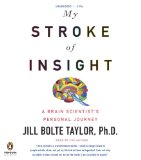
 My Stroke of Insight
My Stroke of InsightA Brain Scientist's Personal Journey
Review posted March 8, 2010.
Penguin Audio, 2008. 5 CDs. 5 hours, 44 minutes.
Starred Review
Sonderbooks Stand-out 2010: #5 Nonfiction: True Stories
Jill Bolte Taylor was a Harvard brain scientist, a neuroanatomist, when she experienced a stroke at age 37, completely disabling the left hemisphere of her brain.
Because she knew so much about the brain, she found herself watching with fascination as the stroke took away more and more of her abilities, as blood was flooding different parts of her brain. She was home alone, unable to understand spoken language or read written language, but she did get occasional waves of clarity, so she managed to figure out what was happening and call for help, even though it took her a long time to figure out what number to call and how to call that number and she didn't know what the other person on the end of the line was saying.
It's fascinating when she tells how she perceived the world when only her right brain was working. She says she felt at one with the universe, like a fluid. She didn't know where her own body began and ended. She didn't know what she was seeing, because her eyes just saw random pixels, and she lost her ability to find edges and define shapes.
It took her eight years, but she eventually recovered completely. Though maybe her voice isn't as accomplished as a professional actress, it meant a lot that she read the audiobook, because the listener can hear for yourself that she is now once again fluent with language.
This book is informative and interesting on so many levels. For the merely curious, it offers all kinds of fascinating information about our brains and how they work. For those who experience stroke some day, it tells you the warning signs, so you may recognize when they are happening. For those who care for a stroke survivor, it tells you how to be an understanding and uplifting caregiver. For example, it's helpful to remember that they are not deaf, they are just having trouble processing what they hear, so raising your voice is the opposite of helpful. The book also explains the things that helped Dr. Taylor to recover completely.
I found it fascinating that when only her right brain was working, Dr. Taylor found herself much more sensitive to a person's energy. She could easily sense if someone was angry or tense or worried, and those people were not nice to be around. But she could also easily sense loving, compassionate people, and she experienced those people as a healing presence.
In her right brain, Dr. Taylor was much more peaceful and joyful. She did find, as she recovered, that she could choose which of her old brain patterns to allow to come back into play. She chose not to restore old patterns of resentment and anger. A big part of her stroke of insight was finding out how much that goes on in our brains is our own choice.
The word I keep thinking of in association with this book is "fascinating." It's a tremendously interesting story for anyone who has a brain.

